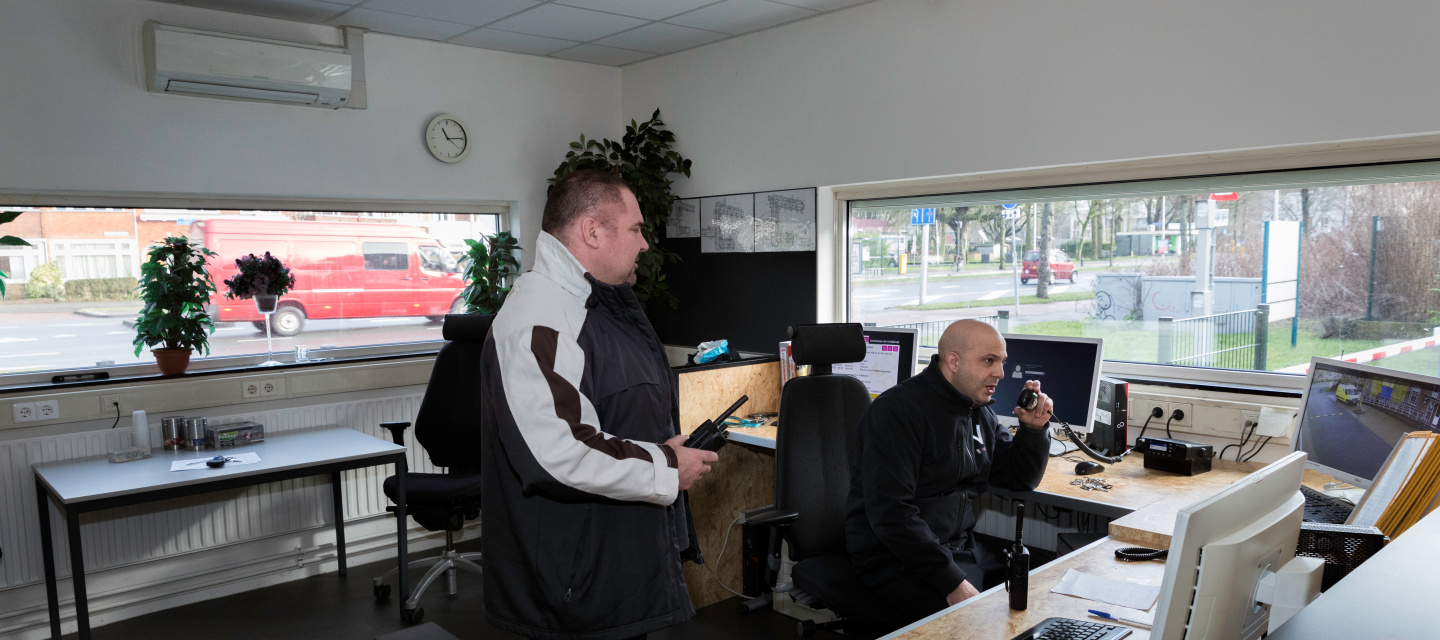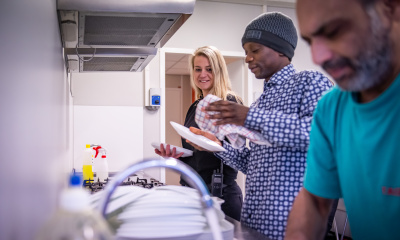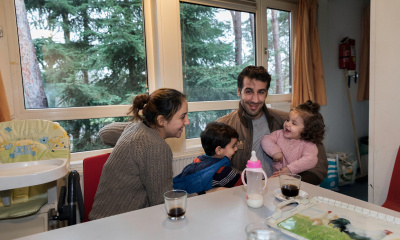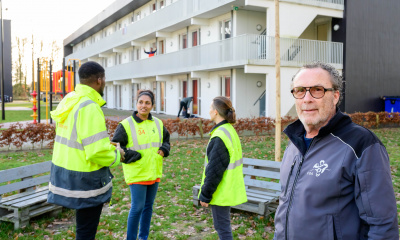The government: cracking down on asylum seekers who cause trouble
The government is taking various measures to crack down on asylum seekers who cause trouble, for example by processing an asylum application faster and providing asylum seekers from safe countries with an more austere form of shelter. We can place asylum seekers in an enforcement and supervision centre if their behaviour causes serious trouble. These measures are implemented through close collaboration between the Ministry of Justice and Security, municipalities, the COA, the IND, the DT&V, Nidos Foundation, the police, the Public Prosecution Service, and the judiciary system.
House rules in reception centres
The COA has house rules, which residents must follow in all reception centres. This allows us to keep reception centres safe and pleasant to live in. For example, residents must keep their accommodation clean, check in their visitors at the reception desk and comply with the obligation to report.
Conversation about house rules and disciplinary measures
Shortly after arrival in the reception centre, the COA has a meeting with a resident. In it, we explain which rights and obligations the resident has. He or she is also informed about the house rules, the Constitution and the consequences of not obeying the rules. The house rules are available in several languages.
Information about the Constitution
In the house rules, we refer to Dutch legislation and Section 1 of the Constitution. In this section, it is laid down by law that discrimination on the basis of religion, beliefs, political affinity, race or sex, or on any other basis whatsoever is not permitted. Discrimination, intimidation and violence are forbidden in the Netherlands.
Security guards
The COA employs security guards. They staff the reception desk and patrol the premises, for example.
Disciplinary measures by the COA
What if residents breach the house rules? Then we take disciplinary measures. The most important measures are listed below.
Disiciplinary policy and Regulations for denial of provisions
Disciplinary measures by the COA vary from having corrective interviews to denial of provisions. All measures have been laid down in our disciplinary policy and the regulations for denial of provisions. For example, the COA can withhold the allowance residents receive. We cannot simply deny residents shelter in the reception centre. However, if residents cause trouble, we can move them to a time-out place, enforcement and supervision centre, or a different reception centre.
Time-out place
After a serious incident, the COA can impose a 'time-out' on a resident. The resident will then stay in a separate, more austere space in the reception centre. The troublemaker will not be given an allowance for food and living, but will receive meals and personal hygiene products in kind. He is not allowed to participate in programmes and activities in the centre. After the time-out, the person who caused trouble can return to his living unit in the reception centre, or the COA may transfer him to a different reception centre.
Enforcement and supervision centre
The COA can also impose the so-called 'htl measure' on asylum seekers who cause a lot of nuisance. They will then temporarily have to go to the enforcement and supervision centre (htl). In this centre, we confront troublemakers with the behaviour they show and help them to improve it.
Splitting up groups and heightened security
If a group of asylum seekers causes nuisance in or around a reception centre, we can split up this group. We can transfer the troublemakers to other reception centres. At centres where there is a lot of disturbance, we can deploy security guards who have been given extra training.
For young people who cause trouble: Nidos Prospect Reception Facility (PON)
When unaccompanied minors (UAMs) cause serious trouble, the COA can place them in Nidos Prospect Reception Facility (PON). This is done in consultation with Nidos. We do this if the COA has no more options to provide the young person with adequate guidance and support. By doing this, we restore peace and safety in the COA centre. In the PON, young people receive intensive guidance and support, and work on their behaviour and prospect of a future in the Netherlands or abroad. There is room for up to 12 young people.
Information about addiction in reception centres
In recent years, there has been a strong increase in the number of incidents related to addiction problems or substance abuse in reception centres. For this reason, 6 addiction experts of the Health Centre for Asylum Seekers (GZA) have set to work. They give recommendations to COA's staff and the GZA on how to provide the best possible support to addicted asylum seekers.
Criminal behaviour: reported to the police
We always report criminal behaviour – or suspicion of it – to the police. We also stimulate victims to report criminal behaviour to the police. COA staff cannot report criminal behaviour to the police on behalf of a victim. However, if they witness an event, they can report this to the police. Every reception centre has short communication lines with the local police. The community police officer is regularly in the reception centre.
Safe Public Function: higher sentencing
People with a public function must be able to do their job safely. In case of violence or aggression against COA staff or other employees with a public function, the Public Prosecution Service (OM) will demand a higher sentence.
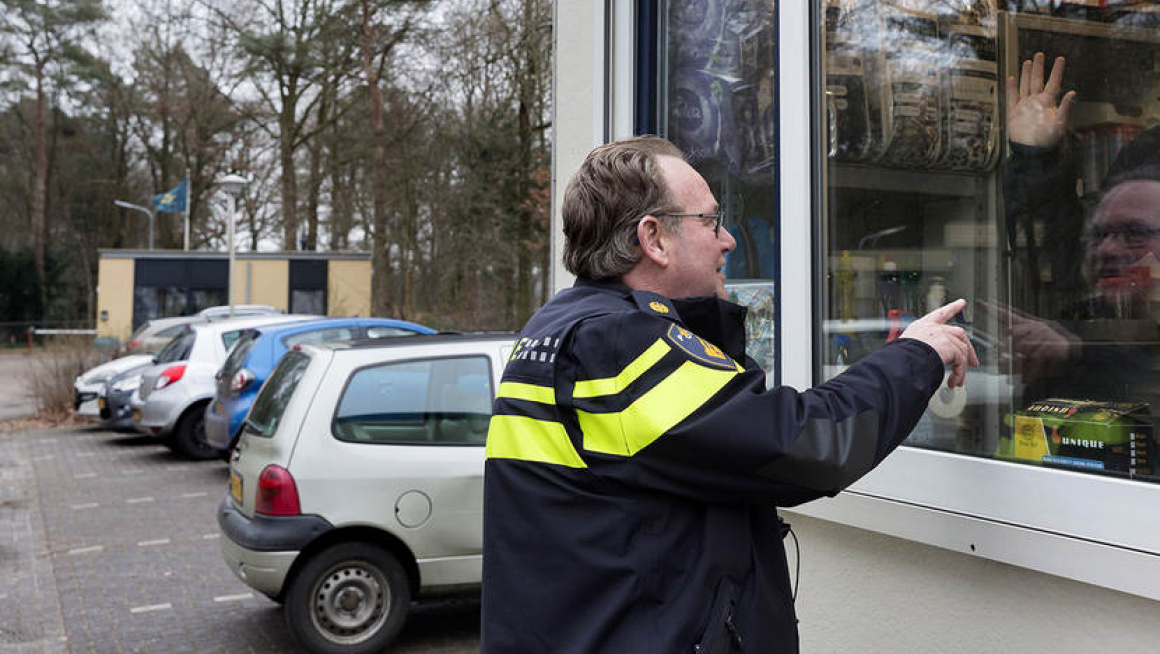
Registration of incidents
The COA registers all incidents in reception centres. These are events that affect the safety, living environment, and manageability of a centre: breaching the house rules, disrupting public order, or committing a crime. It usually concerns breach of the house rules, like not cleaning the own accommodation, smoking in the room, or making noise.
